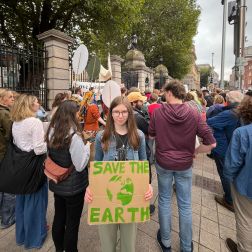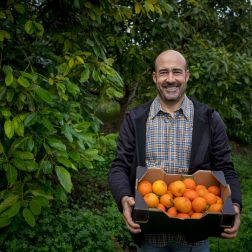- 6 mins read time
- Published: 22nd March 2021
World Water Day 2021: Keep the water flowing

On 3 January 2021, Bangassou – a small town in the south east of the Central African Republic – was attacked by a coalition of armed groups, forcing 14,000 people in the town and its surrounding areas to flee their homes to seek safety. More than two months later, 4,800 people are still living in a makeshift camp in the woods of Cesacoba, 5km from Bangassou, waiting for security to be restored so they can return home.
When they arrived, the only source of water was located deep in the forest and it wasn’t clean enough to drink. Yet they had no other choice than to make the dangerous journey into the woods each day to collect water. When Oxfam arrived in the camp, parents told us that their children had fallen ill with severe diarrhea from drinking the water.
Their living conditions completely changed when, on 10 January, Oxfam built a water-point on-site, providing the camp and its residents with 30,000 liters of chlorinated water each day , along with 50 toilets and 40 showers.
This World Water Day, when around the world people are celebrating the importance of water for us all, we share here the stories of three women – Marcelline, Yvonne and Leonie – who are fighting to survive, struggling to live in better conditions, and hoping for a better future for their children. We also spoke with Serge, a water and sanitation technician who builds forages for the community and for whom water really is life.

Marcelline
“I didn’t understand the gunshots, I did not know where they were coming from. I was scared, I could hear so many gunshots,” says the 36-year-old mother of four, as she recalls the attack on Bangassou on 3 January. In her panic and confusion, she ran in a different direction than her husband and children. Once she had arrived safely at the site, she cried, desolate and fraught with worry for her family. Several hours later Marcelline, crying with relief, finally found them.
That evening, they slept on the cement floor of the church of Cesacoba. Hundreds of other displaced people shared the same dire conditions for almost a month. Some fell sick with diarrhea, malaria or influenza.
Like all the other women staying in Cesacoba, Marcelline had to walk two kilometers to access a small water source, surrounded by trees and “full of bacteria”, before Oxfam took care of the water supply on the site by building a bladder and water pump system.
“These days we have toilets, showers, and water we can drink. It’s made our lives much easier. And now we have all that, I’ve joined the hygiene committee. Because it is our responsibility – those of us who are staying in the site – to clean the latrines. And it does us good [to take on this responsibility].”
Marcelline’s work in the site hygiene committee involves participating in cleaning the facilities, as well as doing door-to-door promotion sessions about cleanliness on the site. According to Marcelline, “these are good ideas that tomorrow we can continue using at home, to educate our children for the future."

Yvonne
“On 3 January I was five months pregnant, and I was terrified of the sound of firearms. I had problems with my heart, my whole body was aching. I didn’t lose consciousness but I was scared,” says Yvonne, 40-years-old and pregnant with her fourth child. “Bullets were flying over our heads.”
With her family, Yvonne left her village and walked until she found refuge in Cesacoba. However, once on the site, a new set of problems presented themselves: she could not earn money anymore, and had to walk long distances to collect water at a small source shared by dozens of other families. She missed being able to go alone to a nearby river to wash her clothes.
When Oxfam built a bladder and pump to provide drinkable water, she felt “like a weight was lifted”, saying it helped her and her family a lot. “Now, I do not need to waste my energy walking too much, and our health is better.”

Léonie
“During the events of 2017, lots of people died. The recent attack brought back those memories and so we ran,” says Leonie, a mother of ten. She was still sleeping when gunshots woke her up and led her family to take refuge at Cesacoba.
“Once I arrived, I was in such a state… I fell badly and had to be brought to the hospital,” she recalls. And she has struggled to adapt to the difficult living conditions in the site. At home, Leonie told us that she had a proper well nearby, and a field she farmed to pay for her children’s school fees.
“But here there is nothing to do but sit and wait. At first, I was terrified for my children as they were falling ill from the water. Even the smallest one fell sick. But now that we have clean water it’s easier. When the water arrived, I was overjoyed. Now my kids can be happy, play ball and dance.”

Serge
Serge used to build houses, however since building his first well in 2019 he has assisted in the construction of more than ten wells around Bangassou. He told us that he is proud of working with NGOs, as it not only means that he is helping the people in his community but also allows him to earn enough to support his five children.
However, he told us that his work is nowhere near finished. “There still aren’t enough water pumps in Bangassou. In some neighbourhoods, people struggle to find water,” Serge told us.
“Here, people in the community come to tell us what an essential job we’re doing. It is important, because water is life."
Oxfam has been working in the Central African Republic since 2014. We respond to the humanitarian crisis by providing water, sanitation and hygiene services, food security and livelihoods, and by working with community-based protection networks. We also develop programs to strengthen civil society. In Bangassou, our programs started in January 2020. We rapidly mobilized to respond to the ongoing crisis, when thousands of people fled from their homes on 3 January 2021. In the Cesacoba site, thanks to support from ECHO, GFFO and USAID’s Bureau for Humanitarian Assistance, we were able to provide 4 800 people with Aquatabs, drinkable water, showers and toilets only nine days after the settlement of IDPs, on 11 January. Since then, we have seen a dramatic reduction in serious diseases amongst children.




